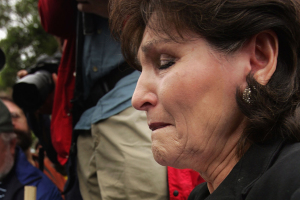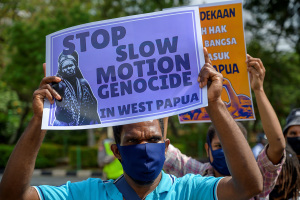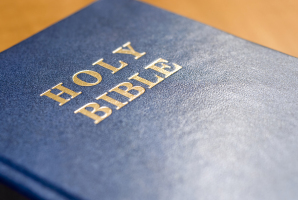Aid Agencies Focus on Providing More Relief to Indonesia
Nearly 800,000 people will need food aid in Indonesia's Aceh province in the aftermath of the devastating Dec. 26 tsunami, a leading U.N. official said Monday
Nearly 800,000 people will need food aid in Indonesia's Aceh province in the aftermath of the devastating Dec. 26 tsunami, a leading U.N. official said Monday, as the country's death toll from the disaster jumped by 5,000 for the second day in a row.
According to the Associated Press, the number of destitute being fed by the World Food Program in Aceh—now at 340,000—was expected to soar as isolated villages are reached and the economic effects of the disaster take root, signaling the enduring deprivation five weeks after the catastrophe.
"We are talking around 790,000 people" who will be in need of food assistance, WFP Aceh chief Claude Jibidar told AP. It was the first time the WFP, which is running the biggest relief operation in Aceh, had put a figure on the number of people lacking food.
However, despite the expected rise in the number of people needing food aid, Jibidar said he was sure that food supplies to the province would be enough to stave off malnutrition, which a report by the world body last week said affected 1 in 8 children in Aceh.
The biggest challenge, AP reported, will be continuing deliveries to western towns and villages that are inaccessible by land because the main coastal road of Indonesia’s tsunami-wracked Sumatra Island was ruined by the waves. Some areas were completely washed out and many bridges were destroyed.
Last week, global agency Church World Service’s (CWS), whose Indonesia team arrived in Banda Aceh on Dec. 29, reported that it and other aid organizations are now turning towards the “very serious” long term recovery needs in the damaged areas of Indonesia.
“But long term recovery in this case must be about the people first, not only about infrastructure," said CWS Emergency Program Director Rick Augsburger, who returned recently from assessment tours of Aceh.
“Re-building viable households, livelihoods, businesses, communities and civil services requires healthy, functioning people," he added. "After a disaster of this magnitude—even a ‘natural’ versus ‘human caused’ one—the likelihood of persistent traumatic stress disorder can’t be ignored.”
The agency also reported that it is continuing its multi-million dollar fundraising campaign, to support extensive long term recovery programs in the worst hit and least served tsunami disaster areas.
To date, Church World Service has delivered more than $1.5 million in food, shelter, hygiene and school kits, blankets and other aid supplies throughout South Asia.




























